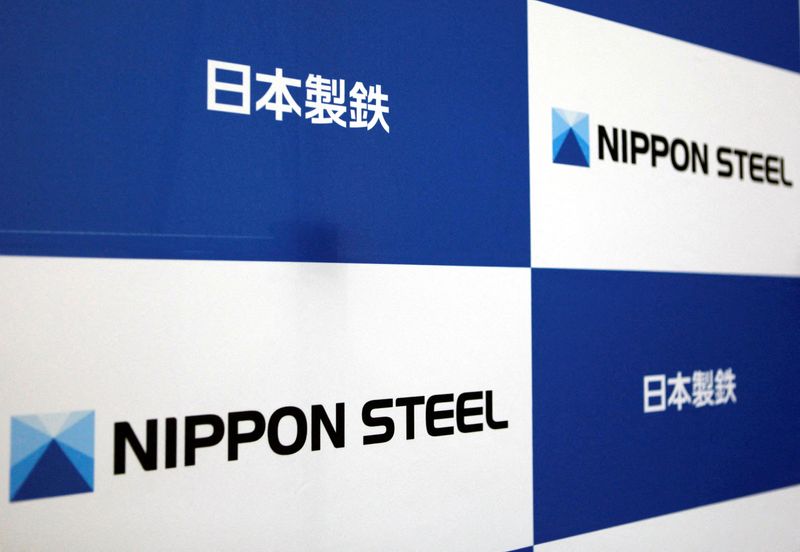This post was originally published on this site
https://i-invdn-com.investing.com/trkd-images/LYNXNPEK3403V_L.jpgTOKYO (Reuters) – Days after President Joe Biden joined his election rival Donald Trump in voicing concern about a Japanese purchase of U.S. Steel, the manufacturer began touting the benefits of the deal on billboards near its factories from Alabama to Pennsylvania.
The billboards may be the most public signs of what some Japanese officials say in private – that despite high hurdles, Nippon Steel could still steer through the fraught $15 billion acquisition of the iconic American manufacturer.
The deal may well hinge on whether regulators avoid election-year politics by clearing the acquisition after Nov. 5, and, critically, on whether Nippon Steel can win over the influential United Steelworkers (USW) labour union.
Opposition from the Pittsburgh-based union has far-reaching implications in an election year where Pennsylvania is seen as a key battleground state.
The deal is effectively “on life support” after Biden’s statement last month that U.S. Steel must remain domestically owned and operated, said David Boling, a former U.S. trade official in Japan who now works for consulting firm Eurasia Group.
Investors seem to agree. Biden’s comment, which followed Trump’s pledge to block the deal if he wins the Nov. 5 election, sent shares in both companies tumbling. U.S. Steel shares last traded at $41.10, well below the $55 per share price Nippon Steel has offered.
Nevertheless, it is still premature to declare the deal dead, four senior Japanese officials speaking on condition of anonymity told Reuters – a view shared by some analysts, consultants and lawyers. The White House declined to comment on whether Biden’s statement meant the purchase could not proceed.
Ongoing regulatory reviews in the U.S. may serve to buy time, thereby delaying a final decision until after the election when the campaign rhetoric has dissipated, the officials and others said.
Furthermore, Nippon Steel could still take steps to ringfence its U.S. operations to ease concerns about foreign ownership.
And finally, the officials and others say, Nippon Steel could make its way through thorny talks and yet win over the steelworkers.
Publicly, Tokyo has sought to distance itself from the deal, saying it is a commercial matter – an approach widely seen as an attempt to play down any controversy ahead of a summit between between Japanese premier Fumio Kishida and Biden in Washington on April 10.
HIGH HURDLES
U.S. Steel’s shareholders are due to vote on the acquisition on April 12, but with the firm’s board having unanimously recommended shareholders approve, analysts expect it to pass.
The next real hurdle is regulatory. The Committee on Foreign Investment in the United States (CFIUS), a government panel that vets deals on national security grounds, is reviewing the transaction. Nippon Steel said the deal is also being examined by antitrust authorities in several countries including the U.S.
An influential U.S. Senator on Tuesday urged the White House to probe Nippon Steel’s exposure to its strategic rival China, a connection the firm has said is “very limited”.
While by law CFIUS should complete deliberations within 90 days, in practice it can take much longer via an increasingly common process where parties withdraw and refile their applications, its latest annual report shows.
“There is unlikely to be a decision until after the election,” said Bill Reinsch, a former U.S. commerce official now advising the Center for Strategic and International Studies. Biden’s comments “have not torpedoed the proposed acquisition,” he added.
Two of the Japanese officials said the timing of the deal ahead of the election has stifled debate about its economic merits and that a delay could help calmer heads prevail.
But taking Biden at his word, getting around foreign ownership concerns won’t be easy.
Nippon Steel has been at pains to stress its “deep roots” in the United States. It has had a presence there since the 1980s and has 4,000 employees in the country.
Nick Wall, a corporate M&A partner with Allen & Overy in Tokyo, said U.S. regulators may grant conditional approval to the deal if the firm makes changes to the management structure or ensures senior personnel are U.S. nationals.
“There could be structures put in place to ensure it’s owned and controlled by U.S. people, even if the economic control lies in Japan,” said Wall, who is not involved in the deal.
The sensitive defence sector provides one such example.
The American subsidiary of British defence contractor BAE Systems (LON:BAES) does business with the U.S. government under a special agreement where the influence and control of its foreign parent is restricted.
A Biden adviser said the policy question was “settled” by the president and that if the deal is to include foreign partners it would need a “different approach”, declining to elaborate.
That puts the focus on the USW, which blasted the deal and both companies for not consulting it before the deal was announced. In a letter to its members on Tuesday, USW leadership called Nippon Steel’s latest pledges to support workers a “collection of empty promises”.
But a source close to Nippon Steel, who declined to be named due to the sensitivity of the negotiations, said the union could be using the political situation to get better terms and appears to remain engaged in talks.

“There will be no problem to clear U.S. Steel shareholders meeting, anti-trust examination, and CFIUS examination, if they are handled normally,” said Shinichiro Ozaki, senior analyst at Daiwa Securities.
“But the most important thing, both before and after Biden’s statement, remains whether or not Nippon Steel can reach an agreement with USW.”

